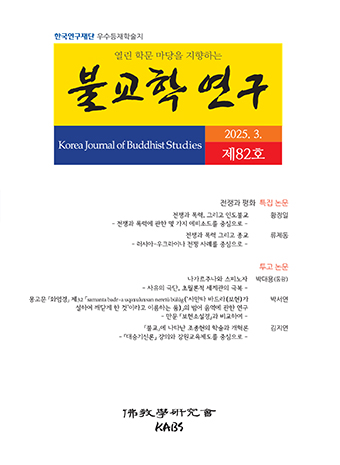Abstract
References
Sorry, not available.
Click the PDF button.
Information
In the modern history of Korean Buddhism, the Jogye Order has gone through repeated bitter disputes that could be attributed to the centralized administration of the Supreme Patriarch and the Executive Director of the Order’s administration. Based on such experiences, the Reformation Order introduced the decentralization of power in 1994. However, the autonomy of parishes has not yet been established. This study presents the factors hampering the introduction of changes to the system, operations, and mentality, as well as suggestions for improvement. First, the factors hampering the establishment of autonomy in the parishes are examined as follows: in terms of the system, the Jogye Order’s centralized laws have attracted a fair amount of critical attention. In terms of operations, great attention has been paid to the question of the inequality of the power within the parish and the inequality of the power between parishes. In terms of mentality, an air of indifference in the central organizations and in the parishes has received much attention. Next, suggestions for improvement and implementation of autonomy within parishes are presented as follows. In terms of the system, the Parish Autonomy Law should be enacted as the parent law, and all relevant laws of the Order should be revised and improved to achieve power decentralization. In terms of operations, first, the council of the parish should be free from the influence of chief monks at the head temple to bolster the checks and balances against parish administration institutions. Second, lay people’s engagement should be allowed for the transparency of administration. Third, the current 25-parish division system should be revised. In terms of mentality, there should be strong determination from both the executive director of the administration of the Order and the parishes to execute delegation of powers.
현대불교사에서 조계종은 종정과 총무원장 중심의 중앙집권으로 인한 쓰라린 분규를 반복적으로 경험하였다. 그리고 이러한 경험을 발판으로, 1994년 개혁종단은 인사권의 교구이양, 교구종회의 신설 등 교구분권적 제도를 도입하였으나, 현재까지도 여전한 중앙집권적 제도와 운영, 그리고 의식으로 인하여 교구자치는 정착되지 못하고 있다. 이에 본고는 제도, 운영, 의식의 측면에서 각각의 저해요인과 개선과제를 제시하고 있다. 우선 교구자치의 저해요인을 살펴보면, 제도 측면에서는 교구의 주요 인사와 재정을 총무원장의 임명과 승인으로 규정하고 있는 조계종의 중앙집권적 제반 법령이 해당된다. 운영 측면에서는 본사주지에게 집중되어 있는 교구내 권력 불균형과 교구본사간 현격한 사세(寺勢)의 차이로 인한 교구간 성장 불균형을 들 수 있다. 의식 측면에서는 총무원장과 본사주지를 중심으로 한 교구자치에 대한 중앙과 교구의 무관심을 제시할 수 있다. 다음으로 교구자치의 개선과제를 살펴보면, 제도 측면에서는 <교구자치법>을 제정 후 이를 모법(母法)으로 삼아서, 교구분권이 이루어질 수 있도록 종단의 관련 법령을 정비하여야 한다. 운영 측면에서는 첫째, 본사주지의 영향력으로부터 교구종회를 독립시켜 교구행정기관에 대한 견제 기능을 강화시켜야 한다. 둘째, 교구의 운영에 신도의 참여를 보장하여 승가의 전유(專有)로 인한 교구행정의 불투명성을 제거하여야 한다. 셋째, 50여 년 전 획정된 현행 25교구체제를 재획정하거나 분구(分區)하여 사회와 종단의 현 상황을 반영할 수 있도록 하여야 한다. 의식 측면에서는 자신의 종단 권력을 나누어주어야 하는 총무원장의 의지와 이를 받고자 하는 교구의 의지가 모두 강력하게 존재하여야 한다.
Click the PDF button.
- Publisher :Korean Association of Buddhist Studies
- Publisher(Ko) :불교학연구회
- Journal Title :Korean Journal of Buddhist Studies
- Journal Title(Ko) :불교학연구
- Volume : 46
- Pages :249~277


 Korean Journal of Buddhist Studies
Korean Journal of Buddhist Studies






